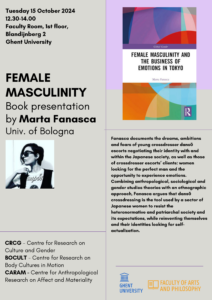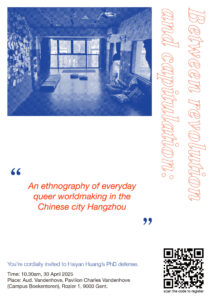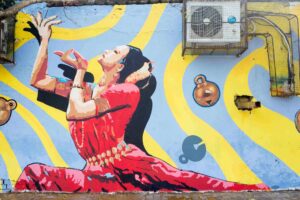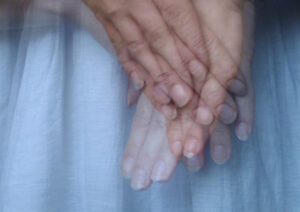
Stimming a Space, visual sketches on stimming documentation, © Anna Püschel, 2022
In the rather recent field of neurodivergent academic writing, the neurodiversity paradigm that treats neurodivergent individuals as equals and entitles them to telling their own story opens new pathways to understanding neurodiversity as a variation of human existence, and brings different ways of thinking-making-being into the discourse. Many authors in this still field choose auto-ethnographic approaches as their methodology in order to disrupt the fictitious dichotomy of normal and pathological, opening their experience to a larger audience and uncovering a sensuous world in constant movement. In her auto-ethnographic artistic research Stimming a Space, visual artist AnnaPüschel explores the entiry neurodivergent bodymind to approach accomodations through an embodied neurodivergent lens. She focuses on stimming (self-regulation) as a powerful tool to create safe spaces and presents it as a radical gesture of selfcare. Her research feeds into current decolonial discourses and serves as an invitation to dwell at the margins of the neurotypical universe.
Anja
Anja Veirman is an art historian/anthropologist who is active on the crossroads of textile studies, global art history and audio-visual ethnography. Onto-epistemologies, relations with the more-than-human, embodied knowledge and co-creation are central to her work.
Anna
Anna Püschel works with photography and texts. Within Fluid Futures, she explores stimming – soothing rhythmical movements – as a way to explore how creative practices can contribute to safer spaces for neurodivergent women in the art world.
FLUID FUTURES
LUCA School of Arts. KU Leuven, Gent.
Tuesday 10 June 2025
12h00 – 13h30
Join us in person
Faculteitszaal (first floor)
Campus Boekentoren, Blandijn
Blandijnberg 2
Ghent University
Directions
Organised by
CRCG – Centre for Research on Culture and Gender
Lisa Franke presents her project proposal submitted to the ERC on how Muslim women’s hair shapes everyday intimate lifeworlds, processes of social transformation, and new religious identities in contemporary Egypt, Lebanon and the United Arab Emirates. By shifting the paradigm from the veil as a marker of inter alia religiosity, the project examines how the attitudes and practices of Muslim women towards their hair condition religious norms and social expectations.
Hair itself remains a neglected theme, despite being central to issues of identity, beauty and processes of individualisation. Even so, there is much contention concerning how Muslim women wear their hair, think and feel about it. Indeed, hair is at the very root of the global contemporary headscarf debate. Hair is both a mundane issue and a disputed one for many women. As such, it is a contentious field that spans the negotiation of gender dynamics, beauty ideals, political orientation, and religious norms.
About the speaker
Lisa Maria Franke is research assistant professor in Islamic Studies at Ghent University in the Department of Languages and Cultures. Her research and teaching focus on the social and intellectual history of Islam and being Muslim in the modern Middle East.
Her research interests include everyday history, eschatology, faith and identity, discourse analysis and gender studies; individuality, religious transformation processes and social dynamics; modern Arabic literature; language as a form of mediation in various text forms. Read more
Register and attend online
Click here to register and join on Microsoft Teams

Laura Menin’s ethnography focuses on young women living in the low-income and lower-middle-class neighborhoods of a midsized town in Central Morocco, far from the overt influence of city life. At the heart of the book, Menin draws upon ideas of “love” as an ethnographic object and source of theoretical examination.
She demonstrates that love, as a complex cultural and historical phenomenon shaped through intersecting socioeconomic and political developments, is crucial in thinking through generational changes and debates in Morocco and the Middle East more broadly. What is at stake in the quest for love, she argues, is not only the making of gendered selves and intimate relationships, but also the imagination of social and political life. Read more
About the speaker
Laura Menin is a research associate in the School of Global Studies at the University of Sussex. She has published numerous articles in the Middle East Journal of Culture and Communication, Contemporary Levant, and the Journal of the Royal Anthropological Institute.
29 April 2025
16h00 – 18h00 (GMT +1)
Join us in person
Auditorium 1 Jan Broeckx
Faculty of Arts
Blandijnberg 2
9000 Gent
Directions
This book presentation is part of the Middle East Studies Research Seminar Series
Organised by
Arabic, Islamic and Middle East Studies Middle East Studies at Ghent University
Co-organised by
CARAM – Centre for Anthropological Research on Affect and Materiality
CRCG – Centre for Research on Culture and Gender

Drawing on ethnographic data from the early 2020s, this presentation explores the relation between women’s agency and their degree of adherence to patriarchal values in an environment subjected to rapid and intense changes. It focuses on women practising Odissi dance, considered by the government of India to be one of the “Indian classical dances”, in the urban context of Bhubaneswar, capital city of the Indian State Odisha, in which these practices thrive.
India has undergone rapid socio-economic and technological transformations in the past decades. Moreover, the city of Bhubaneswar has experienced a particular stark growth. This has affected the socio-economic fabric that support Odissi dance practices, based on a social order regulated by pronounced gender asymmetries. How do these changes affect the gendered equilibrium? What are the present constraints and opportunities? How do values and norms evolve in such a context?
Barbara Čurda is an anthropologist, and has been working as a Marie Curie fellow on the MSCA-IF-GF project GATRODI* (Gender asymmetry in the transmission of Odissi dance in India – a case study). The project interrogates relational dynamics and conceptions of know-how amongst dance practitioners, using qualitative and ethnographic methods.
Her research interests include gender, inequalities, corporeal practices, heritage, and South Asia. She holds a PhD in anthropology from the Université Blaise Pascal (France), and has taught extensively in the higher education sector and notably at the Université Clermont Auvergne (France).
This project has received funding from the European Union’s Horizon 2020 research and innovation programme under the Marie Sklodowska-Curie grant agreement No. 101033051.
Organised by
GCSAS – Ghent Centre for South Asian Studies
CRCG – Center for Research on Culture and Gender
Do you wish to attend the seminar in person? Join us at:
Faculteitszaal (first floor)
Campus Boekentoren, Blandijn
Blandijnberg 2
Ghent University
To follow online register here

On Tuesday, December 3, 2024, Nika Looman’s public defense will take place. We would like to cordially invite you to attend in person or via live stream.
Nika has been working on their research ‘Queer late/r life sex. Women and non-binary people’s unruly stories’ for four years. To conclude this trajectory, Nika will defend their research and receive their doctorate.
After the defense, there will be a reception where you can congratulate Nika. In support of Palestine and in line with the BDS (boycott, divest and sanctions) guidelines, only coffee and tea will be served.
We hope to see you on this special day. If you have any questions about the defense, please do not hesitate to contact us (mars@essb.eur.nl).
About the research
This dissertation centralizes the unruly sexual stories of queer women and non-binary people between the ages of forty-four and eighty-six. Their stories disrupt the limiting and contradicting narratives of ageing as decline or that promise success when sexual attractiveness and sexual availability are maintained late/r in life.
By paying careful attention to the entangledness of materiality, discourse, and un/expected relations to sex late/r in life, this dissertation examines how stories of old/er queer women and non-binary people can (re)configure prevailing narratives of ageing, sex, and intimacy.
Nika Looman completed their doctoral research within the ERC-project LiLI ‘Later-in-Life Intimacy: Women’s Unruly Practices, Places and Representations’at Ghent University’s Centre for Research on Culture and Gender.
Details
Date and time
Tuesday, 3 December 2024 – 16h00 (GMT+1)
After 16h15 it will not be possible to enter the ceremony hall anymore.
Join in person
Chapel of the Convent of Saint Agnes
Oudezijds Voorburgwal 229-231
1012 EZ Amsterdam
The Netherlands
Join the live stream by simply clicking the link below, no registration required
Queer late/r life sex. Women and non binary people’s unruly stories Online.
The seminar
The topic of gender justice must begin with the inevitable question: what gender is justice? Linda R. Hirshman asks, “Is the law male?” Hirshman’s question points out how the “maleness” of the legal system affects every woman.
Dr. Pan’s lecture will focus on gender justice through the lens of intersectionality to emphasize the necessity of recognizing the interconnectedness as well as differences among categories. Intersectionality challenges traditional notions of justice that treat social categories as separate or distinct.
Instead, it calls for an approach to justice that acknowledges how various systems of oppression (e.g., sexism, casteism, classism) intersect and compound one another. Achieving gender justice, therefore, requires addressing these interconnected forms of oppression holistically.
About the speaker
Dr. Anandita Pan is an Assistant Professor in the Department of Liberal Arts, IIT Hyderabad. Her areas of interest are Feminist theory, Gender Studies, and Dalit Feminism. She is the author of Mapping Dalit Feminism: Towards An Intersectional Standpoint (Sage-Stree, 2020) and Aesthetics in India: Transitions and Transformations (Orient Blackswan, 2023). She is the recipient of the President’s Award for Best paper at the IAWS conference, 2020.
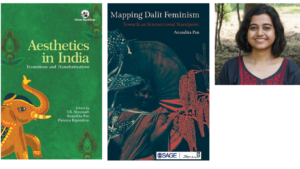
9 December 2024
12h00 – 13h30
Join us in person
Ghent University – Campus Tweekerken
Room 1.10
Sint-Pietersplein 7 – 9000 Ghent
Register and attend online
Click here to register and join on Microsoft Teams
Organised by
SANGH – South Asia Network Ghent
CRCG – Center for Research on Culture and Gender
Contact: Hannah.VandenBroucke@UGent.be
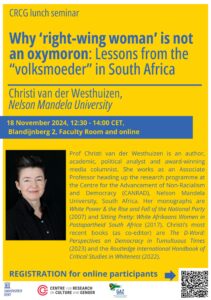
Why ‘right-wing woman’ is not an oxymoron: Lessons from the volksmoeder in South Africa
Christi van der Westhuizen
Centre for the Advancement of Non-Racialism and Democracy, Nelson Mandela University, South Africa
christivdw@mandela.ac.za
Abstract
Ethno-racial populisms currently surging across the globe have driven contestation over gender to a fever pitch. Women’s right to political agency and control over their bodies is under direct attack or being strictly circumscribed. Notably, right-wing women are firmly involved in intensified attempts to reverse the gains of successive waves of feminism. This presentation draws on historical research and interviews to make sense of how women come to advance or resist patriarchal politics. The rise and fall and (unexpected) rise of the Afrikaner nationalist volksmoeder (mother of the nation) in South Africa is illustrative of how women are mobilised and demobilised in the service of nationalisms. Afrikaner nationalist women were more publicly and politically active in the first half of the 20th century than the second half. They vigorously contributed to the version of Afrikaner identity that in 1948 tipped South Africa into the intensified form of colonialism known as apartheid but disappeared from public view after 1948. The volksmoeder assigned feminine care for the family and the volk to women. The flipside of its normalisation of ‘woman/wife-as-mother’ was to return Afrikaner women to the domestic realm with the demand of silence, service, and sexuality purposed for white reproduction, or ‘white sex’. After the transition to constitutional democracy in 1994, the volksmoeder imaginary is unexpectedly bolstered, receiving a revivalist injection from neoliberal and postfeminist versions of motherhood that coax women into an enclave form of nationalism.
Prof Christi van der Westhuizen is an author, academic, political analyst and award-winning media columnist. Her research interests are transdisciplinary, broadly focused on identity, difference, ideology and democracy in postcolonial contexts. She works as an Associate Professor heading up the research programme at the Centre for the Advancement of Non-Racialism and Democracy (CANRAD), Nelson Mandela University, South Africa. In 2022, she was a Visiting Professor at the Research Centre Global Dynamics at Leipzig University, Germany. Her monographs are:
- White Power & the Rise and Fall of the National Party(2007) and
- Sitting Pretty: White Afrikaans Women in Postapartheid South Africa(2017).
Christi’s most recent books (as co-editor) are titled The D-Word: Perspectives on Democracy in Tumultuous Times (2023) and the Routledge International Handbook of Critical Studies in Whiteness (2022). She has published in journals such as Africa Today, Comparativ, African Studies, Critical Philosophy of Race, and Matatu Journal for African Culture and Society. Her Doctorate in Sociology is from the University of Cape Town and she has held associateships with several universities. Christi’s media columns and analysis have featured in both South African and global news outlets.
Female Masculinity and the Business of Emotions in Tokyo investigates the novel “emotion business” of dansō escorting as a phenomenon emerging between gender performativity and pop-culture, commodified relationships and the wish for self-expression.
Fanasca documents the dreams, ambitions and fears of young crossdresser escorts negotiating their identity with and within the Japanese society, as well as those of crossdresser escorts’ clients: women looking for the perfect man and the opportunity to experience emotions. Combining anthropological, sociological and gender studies theories with an ethnographic approach, Fanasca argues that dansō crossdressing is the tool used by a sector of Japanese women to resist the heteronormative and patriarchal society and its expectations, while reinventing themselves and their identities looking for self-actualization.
Female Masculinity and the Business of Emotions Tokyo is an interdisciplinary work which will interest both scholars and students of Japanese studies, gender studies, and anthropology.
Organised by:
CRCG – Centre for Research on Culture and Gender
BOCULT – Centre for Research on Body Cultures in Motion
CARAM – Centre for Anthropological Research on Affect and Materiality
